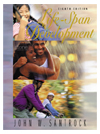 |  Life-Span Development, 8/e John W. Santrock,
University of Texas - Dallas
Early Adulthood Physical and Cognitive Development in Early Adulthood
Chapter ObjectivesI.Discuss the criteria for becoming an adult. |
 |  |  | II.Elaborate on the transition from high school to college. |
 |  |  | III.Explain the changes in physical development that occur during early adulthood. |
 |  |  | IV.Explain the causes of and concerns about obesity, and then discuss the issues surrounding dieting and exercise. |
 |  |  | V.Explore the issue of substance abuse in the college population. |
 |  |  | VI.Define addiction and explain the two models of addiction. |
 |  |  | VII.Examine heterosexual attitudes and behaviors during early adulthood. |
 |  |  | VIII.Examine homosexual attitudes and behaviors during early adulthood. |
 |  |  | IX.Describe the sexually transmitted diseases prevalent among young adults, and discuss ways to protect against them. |
 |  |  | X.Elaborate on the factors associated with rape and sexual harassment. |
 |  |  | XI.Address the ways in which cognition changes during early adulthood. |
 |  |  | XII.Explain the changes that take place in creativity in early adulthood and ways to encourage it. |
 |  |  | XIII.Indicate the development changes that take place in career choices, and describe Holland's career-related personality types. |
 |  |  | XIV.Explain the process of choosing a career and what employers look for. |
 |  |  | XV.Discuss the importance of work and how it shapes the identity of the young adult. |
|



 2002 McGraw-Hill Higher Education
2002 McGraw-Hill Higher Education